It's time for the voters to step aside
The problem isn't the candidates. It's the idiots who chose them.
Welcome to the weekend edition of The Experiment, your official hopepunk newsletter. If you’d like to support my work, become a paid subscriber or check out the options below. But even if you don’t, this bugga free. Thanks for reading!
In a recent Yahoo/YouGov/OMG/JFC poll, 1,794 American adults were asked, “How anxious, if at all, are you about the upcoming presidential election in November?” Their options were very anxious, somewhat anxious, are you kidding me, who gave you my number, seriously, are you kidding me with this, and not sure. A third of American adults seem to be doing fine, and they are excused from the following discussion. Also: liars. A full 10% reported that they were not sure whether they were anxious about the elections. I envy their bliss and puzzle over their oblivion.
That leaves 60% of Americans admitting to feeling anxious about the presidential election, and that was before Thursday’s disaster of a debate in which a mendacious, felonious, and seditious rapist was judged the clear winner over a dear man who got lost in the middle of sentences. The baseline thrum of anxiety over the choices available to voters in November has reached horror-movie-soundtrack levels, begging the question who in their right minds picked these two goombahs?
Oh, right. We did. To be sure, Donald Trump should be in prison, and Joe Biden needs a nice, tall glass of lemonade and a sit. But it’s us, American adults, who maybe need to sit this one out and let the kids pick the next president.
Brené Brown, also an American adult but seemingly better at it than most, was asked on a recent episode of the podcast Pivot about the historically high level of anxiety among adults about the elections. Unlike most observers, who blamed the obviously flawed candidates, Brown turned it back on what’s wrong with the voters. We’ve lost faith in ourselves.
“We are experiencing at the greatest level in my lifetime, an amazing lack of a sense of agency,” she said, citing C.R. Snyder’s groundbreaking research into hope, commonly called Snyder’s Hope Theory. “Hope is actually not an emotion. Hope is a cognitive behavioral process,” she said. “And hope is three pieces.”
They are goal, pathway, and agency. Having the capacity to set a goal is a separate behavior from developing a pathway to that goal and then another when the first one is blocked and then another when it turns out the second idea was illegal in seven states.
“And then the last part of hope … is agency. I believe in my capacity to create change, to do something for myself,” said Brown. “I've never seen the levels of hopelessness that I see right now in people. And I don't know if … people are just shrugging and saying, what difference does it make?”
“Hope is actually not an emotion. Hope is a cognitive behavioral process.”
Want to measure your own hope, punk? Go here and answer each question on a scale of one to eight from definitely false to definitely true. Statements 2, 9, 10, and 12 go to agency, and if you’re anything like me, you’re not lacking in the abilities to set goals and chart pathways, but when it comes to believing in myself, boy howdy. Maybe not. That’s the way to understand Brown when she talks about agency. It means believing I don’t suck.
And when we’re talking about this election, said Brown, “We're building on a very cracked foundation. … People are not okay. We are still not OK from the pandemic. We're still not OK from the long overdue … racial reckoning. This is still happening. We're not OK. … Any crisis like the pandemic is going to expose fault lines in systems and … our fault lines are exposed right now. We're holding on as hard as we can, as tight as we can. And this thing is coming barreling toward us.”
This thing felt a lot closer on Thursday night when every text chain you were on exploded into full-throated panic. Here are some of the texts I got during the debate, and keep in mind, these aren’t from Trumpy uncles and boomer parents. These are the unfiltered insights of reporters and Democratic operatives.
Two things are obvious the morning after. First, Biden has noticeably declined. No sense pretending otherwise. Mark that on the wall. And then above that is the level of voter anxiety. Even considering the fact that the Commander-in-Chief might not be up to serve another four months let alone four more years, the voters are not OK. As Brown put it, our fault lines are exposed, and they’ll remain exposed even if Biden steps aside for a magical unicorn Democrat who everyone is happy with hahaha oh my god we’re all going to die.
What happens to an excessively anxious electorate? Symptoms may include intrusive thoughts (see also: “hahaha oh my god we’re all going to die”), compulsive behaviors (Ask me how my fantasy baseball team is doing. I dare you.), avoidance (I was grateful that I had a school board meeting last night so I didn’t have to choose not to watch the debate.), physical problems, and cognitive problems such as impaired decision-making and warped perceptions.
That’s the only possible explanation for a poll of swing-state voters I saw recently. Apparently they agree that representative democracy is a good thing worth saving and that our democratic system is under threat. What they don’t agree on is whether Biden or Trump would do a better job preserving democracy. Again, your choices are Biden, who has made preserving democracy an admirable bedrock of his campaign, and Trump, who calls convicted insurrectionists “political prisoners.”
Swing-state voters think Trump would do a better job at preserving democracy, 44%-33%.
A colleague recently likened the Democrats’ situationship with Biden to that of adult children needing to take the car keys away from an aging parent. But what do we do when those adult children start spouting this kind of irredeemable nonsense? What does it say about us if pollsters ask us whether a hot dog is a sandwich and we answer “blue”?
As I was reading the article about the swing-state poll, the opening words of Dessa’s “Congratulations” from The Hamilton Mixtape ran through my head.
Congratulations You have invented a new kind of stupid A 'damage you can never undo' kind of stupid An 'open all the cages in the zoo' kind of stupid' Truly, you didn't think this through?' kind of stupid
Dessa was singing from the point of view of Angelica Schuyler to her brother-in-law Alexander Hamilton. It’s tempting for Democrats and fellow travelers to direct those words at Biden for not stepping down and his team for propping him up. But I’m as guilty as anyone for not seeing things clearly through my anxiety haze. Trump, who has his own obvious mental and emotional challenges, was was making bad-faith arguments about Biden’s fitness, so I assumed Biden was probably fine. Both things can be true: Trump’s as bad as he seems, and so is Biden. Add to that a third: I am not OK, and neither are most of us.
We are butting up against “a ‘damage you can never undo’ kind of stupid,” but it’s us, the voters who are doing it. And while we fantasize about who might have the gravitas to have the talk with Uncle Joey B, we need to face that we, the voters, are not OK and not to be trusted with sharp scissors, much less ballots.
It’s time for us to step aside. As the recently departed Kinky Friedman once said, “Politics is the only field of human endeavor where the more experience you have, the worse you get.” The same goes for us, the damned electorate. Let the kids vote. After all, they’re the ones who will be stuck with this mess.
Jason Stanford is a co-author of NYT-best selling Forget the Alamo: The Rise and Fall of an American Myth. His bylines have appeared in the Washington Post, Time, and Texas Monthly, among others. Follow him on Threads at @jasonstanford, or email him at jason31170@gmail.com.
Further Reading
We set up a merch table in the back where you can get T-shirts, coffee mugs, and even tote bags now. Show the world that you’re part of The Experiment.
We’ve also got a tip jar, and I promise to waste every cent you give me on having fun, because writing this newsletter for you is how I have fun.
Buy the book Texas Lt. Gov. Dan Patrick banned from the Bullock Texas History Museum: Forget the Alamo: The Rise and Fall of the American Myth by Bryan Burrough, Chris Tomlinson, and myself is out from Penguin Random House. The New York Times bestseller is out in paperback now!




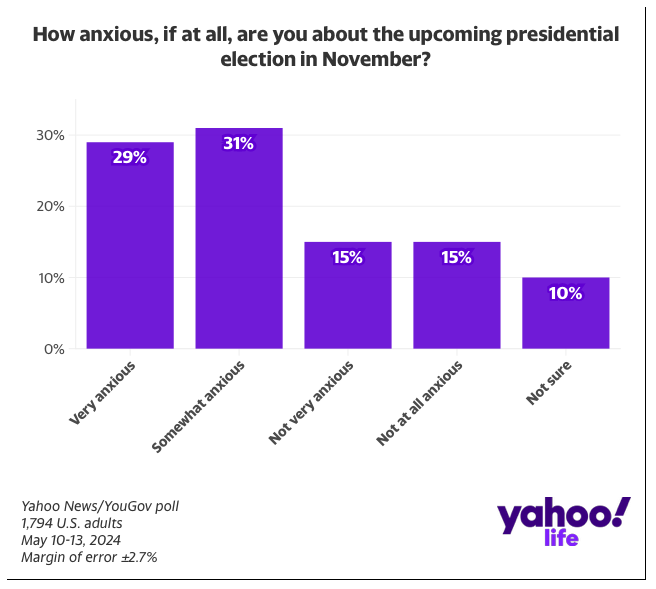
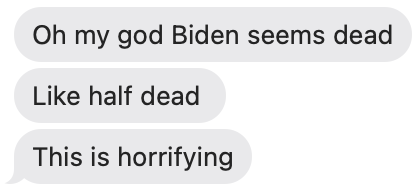
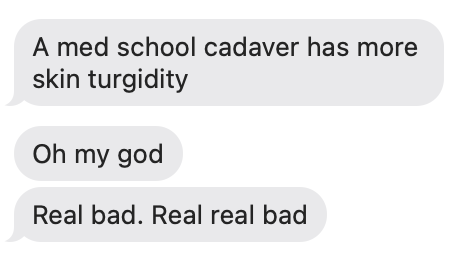
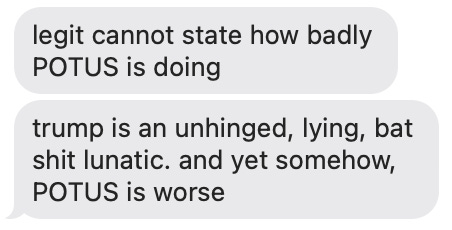
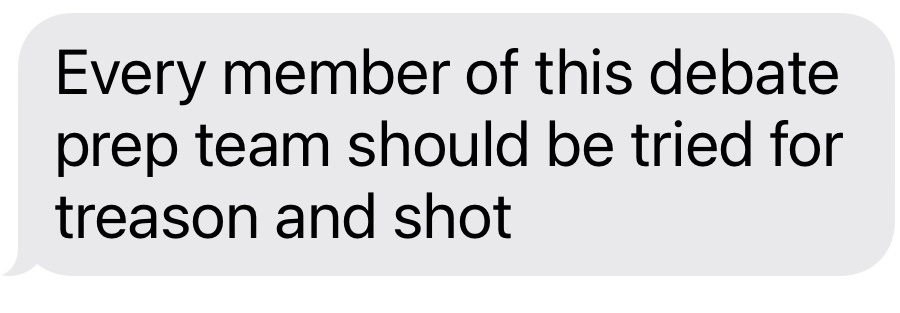
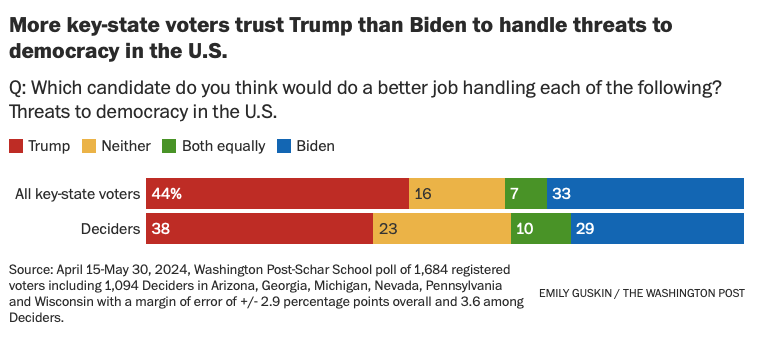


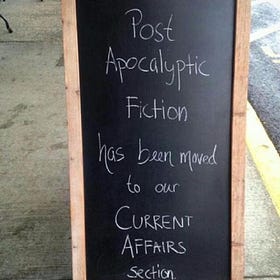



I am not on either company payroll and am frequently wrong, but if I were on either side's senior staff I probably would want as few people as possible to see my candidate on a debate stage, and the best way to ensure that is to hold a debate in the dog days of summer when no one is home and absolutely no one is watching debates.
Just saying.
You are certainly correct about us, broadly, not being ok. But you know as well as anyone that voters do not choose these people in a direct process. It is a highly structured process that gives very few voters genuine control over the choices they are presented with.
Unlike many people who know this to be true, I don’t think process reforms are nearly as important as agenda and organizing changes at the base of society. But the problem is not democracy. It is a profound lack of democracy already decades in the making.